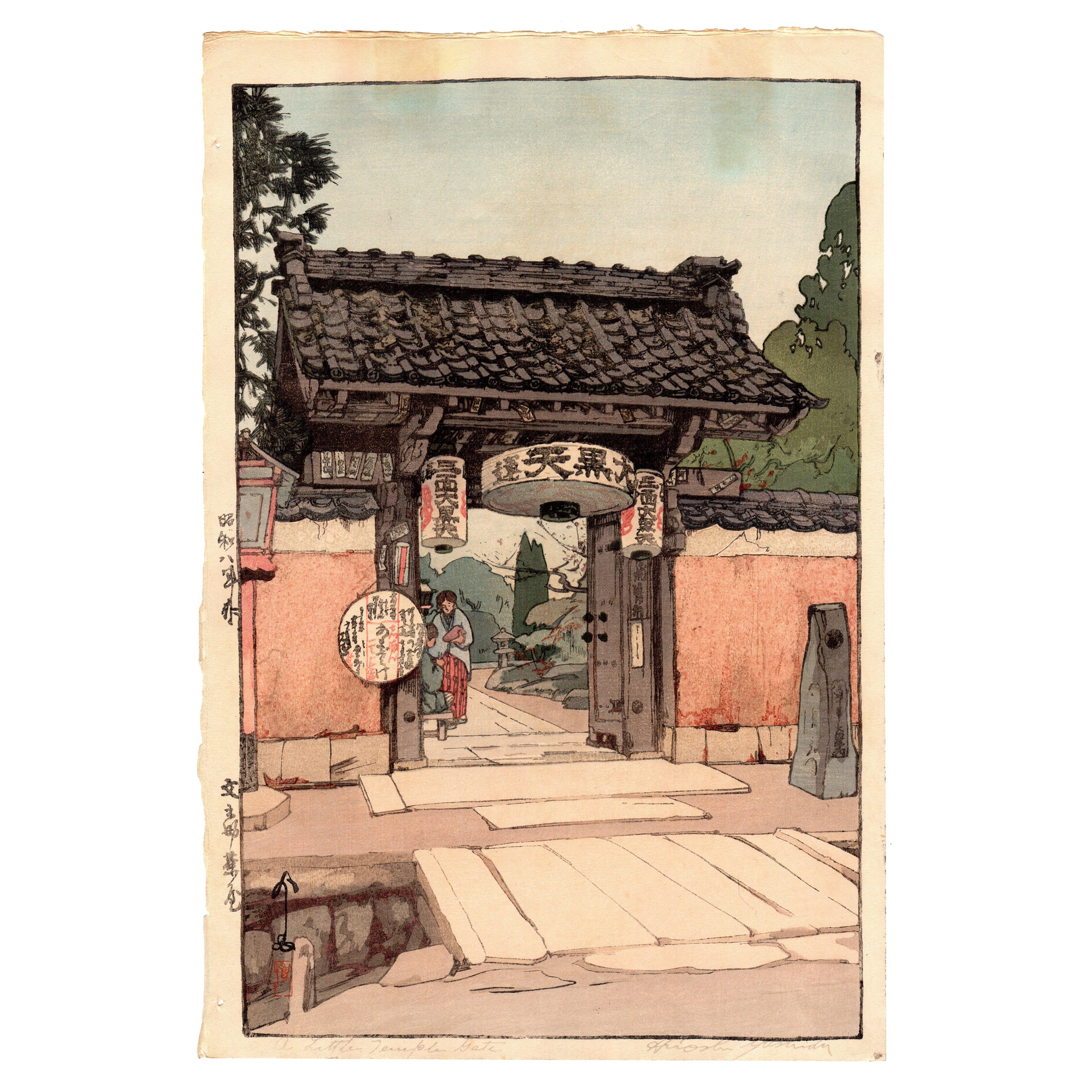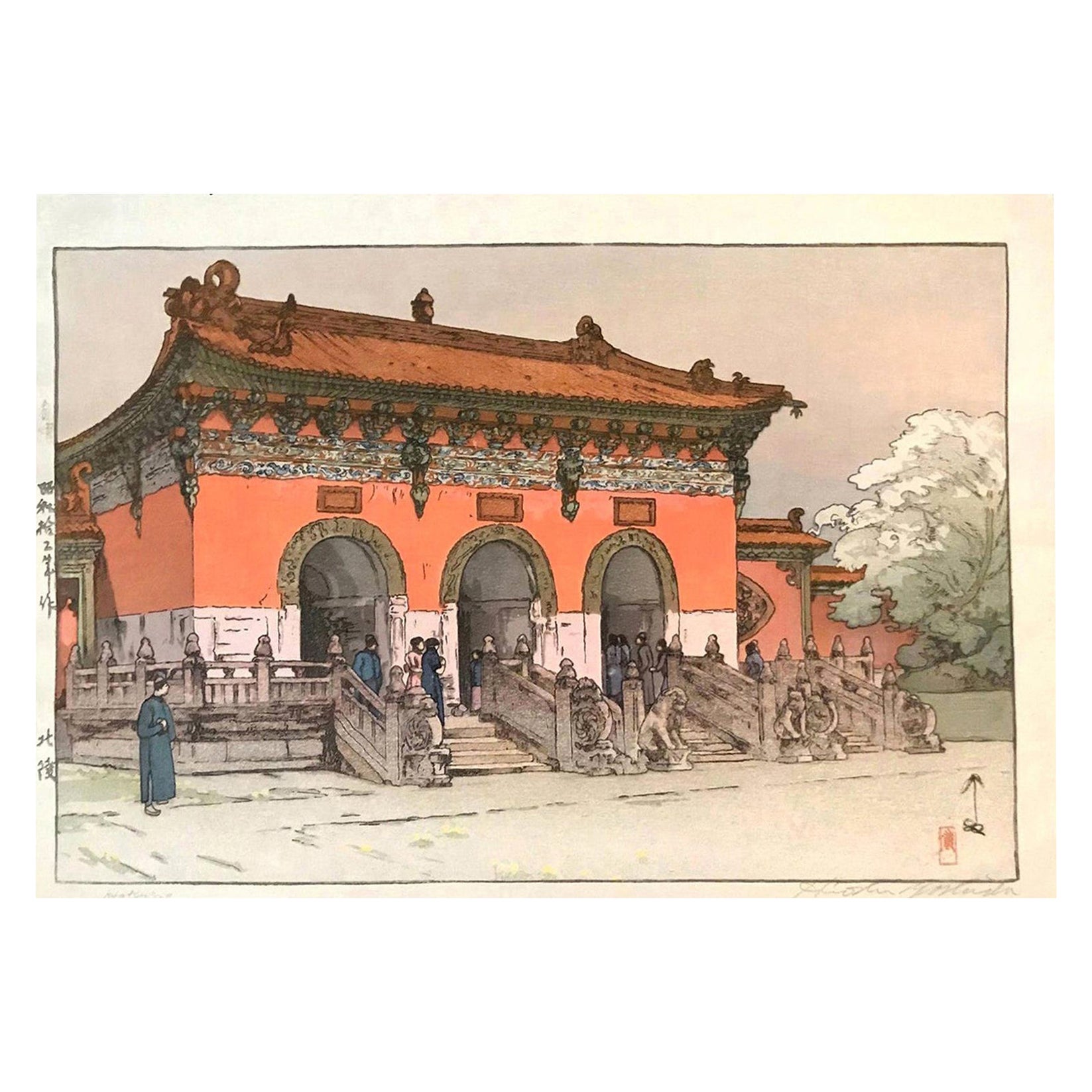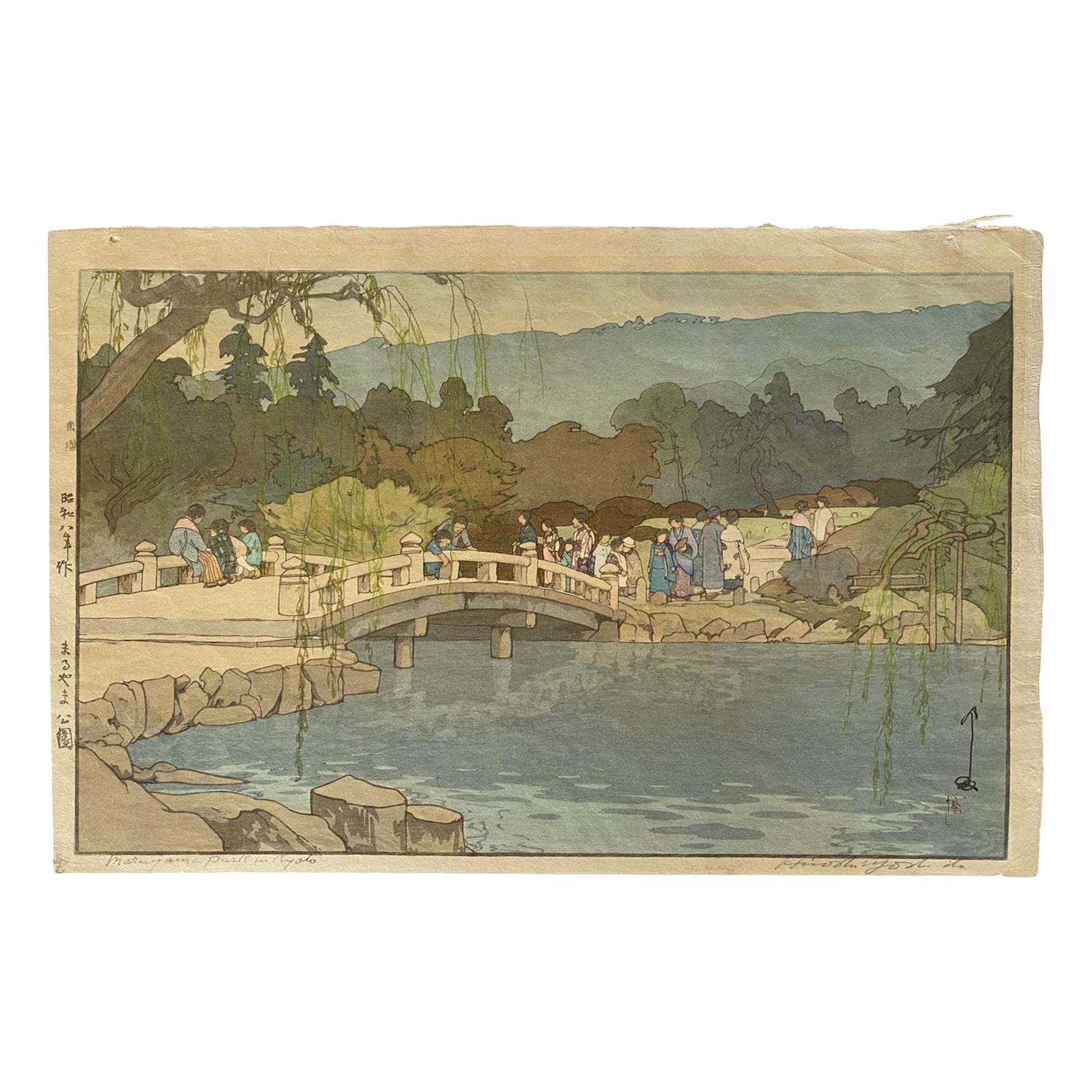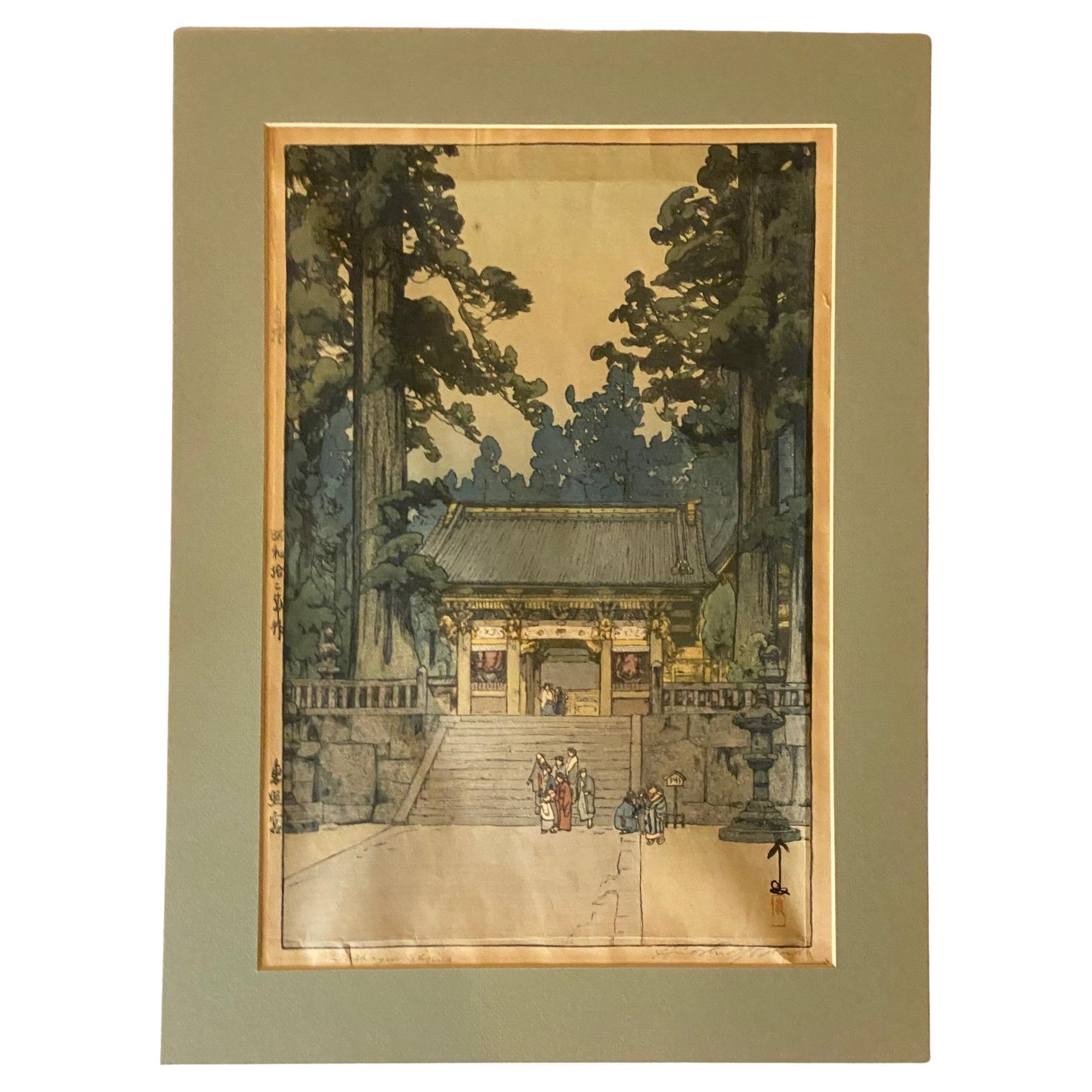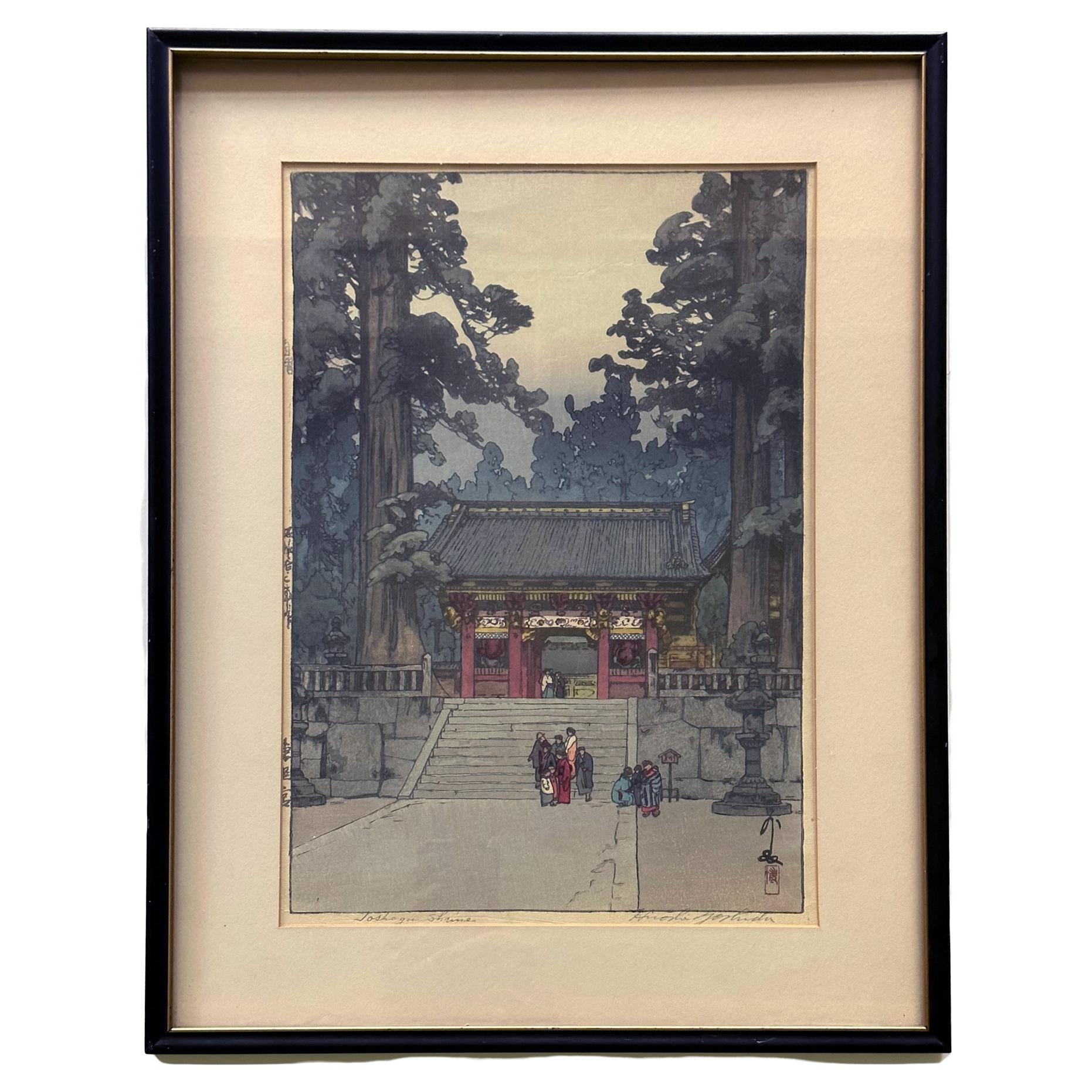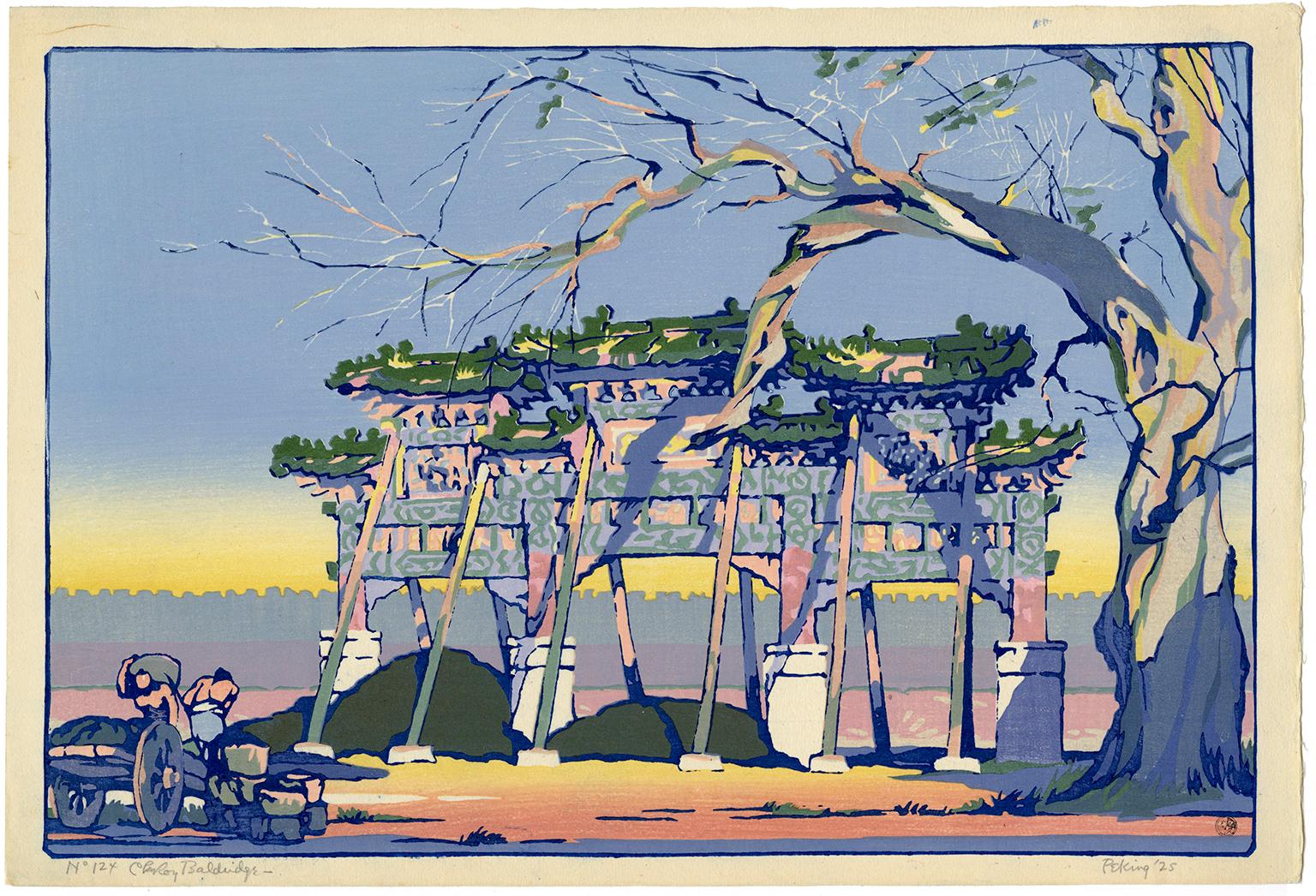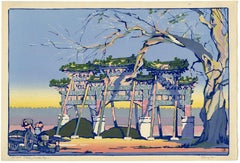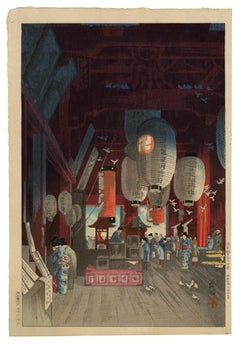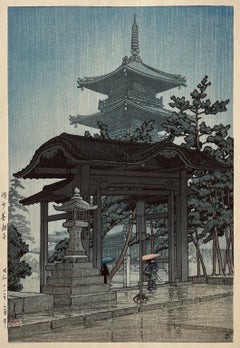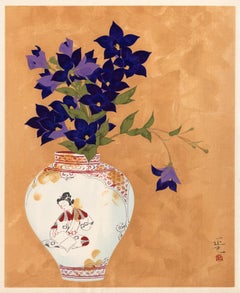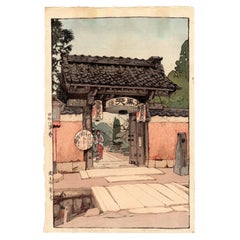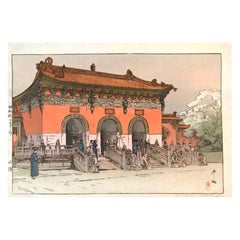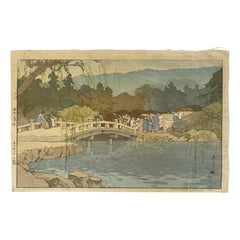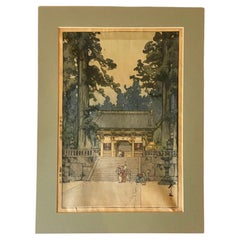Items Similar to 'Chion-in Temple Gate' from 'Eight Scenes of Cherry Blossoms' — Jizuri Seal
Want more images or videos?
Request additional images or videos from the seller
1 of 3
Hiroshi Yoshida'Chion-in Temple Gate' from 'Eight Scenes of Cherry Blossoms' — Jizuri Seal1935
1935
$3,600
£2,784.45
€3,169.94
CA$5,169.02
A$5,647.31
CHF 2,959.78
MX$67,430.71
NOK 37,456.24
SEK 34,927.17
DKK 23,674.38
About the Item
Hiroshi Yoshida, 'Chion-in Temple Gate (Sunset)' from the series 'Eight Scenes of Cherry Blossoms (Sakura hachi dai: Sakura mon)', color woodblock print, 1935. Signed in brush 'Yoshida' and in pencil 'Hiroshi Yoshida'. A superb, early impression, with fresh colors; the full sheet with margins, on cream Japan paper; an area of slight toning in the top right sheet corner, not affecting the image, otherwise in excellent condition. Marked with a jizuri (self-printed) seal, upper left margin. Self-published by the artist.
Image size 9 5/8 x 14 3/4 inches (444 x 375 mm); sheet size 10 7/8 x 16 inches (276 x 406 mm). Archivally sleeved, unmatted.
Provenance: M. Nakazawa, Tokyo.
Literature: Japanese Landscapes of the 20th Century (Hotei Publishing calendar), 2001, May.
Collections: Honolulu Museum of Art, Museum of Fine Arts, Boston.
ABOUT THE IMAGE
Located in Kyoto, Chionin is the main temple of the Jodo sect of Japanese Buddhism, one of the most popular Buddhist sects in Japan, having millions of followers. The Sanmon Gate, Chionin's entrance gate, standing 24 meters tall and 50 meters wide, it is the largest wooden temple gate in Japan and dates back to the early 1600s. Behind the gate, a broad set of stairs leads to the main temple grounds.
ABOUT THE ARTIST
Painter and printmaker Yoshida Hiroshi (1876-1950) is regarded as one of the greatest artists of the Japanese 'shin hanga' (New Print) movement.
Yoshida was born as the second son of Ueda Tsukane in Kurume, Fukuoka Prefecture, a schoolteacher from an old samurai family. In 1891 he was adopted by his art teacher Yoshida Kasaburo in Fukuoka and took his surname. In 1893 he went to Kyoto to study painting, and the following year to Tokyo to join Koyama Shotaro's Fudosha private school; he also became a member of the Meiji Fine Arts Society. These institutions taught and advocated Western-style painting, greatly influencing Yoshida’s artistic development.
In 1899 Yoshida had his first American exhibition at Detroit Museum of Art (now Detroit Institute of Art), making the first of many visits to the US and Europe. In 1902 he helped reorganize the Meiji Fine Arts Society, renaming it the Taiheiyo-Gakai (Pacific Painting Association). He again traveled to the US, Europe, and North Africa in 1903-7, with his stepsister and fellow artist Fujio, whom he married on their return. From then until 1920, he achieved great success as a painter in oils and watercolor—his impeccable draftsmanship and harmonious colors receiving widespread appreciation. Yoshida’s success, coupled with his independent spirit, led him into conflict with the tradition-laden artistic establishment in Japan.
In 1920, Yoshida began to design woodblock prints for the esteemed publisher Shōzaburō Watanabe, who wanted a Western-style artist in his stable. The Kanto earthquake of September 1923 destroyed Watanabe’s workshop, and all the blocks for Yoshida’s prints and existing stock were lost. Soon after that, he returned to the US—this time to raise funds for himself and his fellow artists. In touring the western US he discovered that expertly produced prints were eagerly sought after. On his return to Japan, he established his workshop to have autonomy over his woodblock print designs.
From 1925 onwards Yoshida devoted his career principally to producing woodblock prints. He carefully supervised every aspect of the printmaking process, ensuring that his exacting standards were met. Many of his print series were inspired by his foreign travels, including those of the US, Canada, Europe, Egypt, India, Korea, and China (visited in 1936). In 1938 he went on the first of three further trips to China as an official war artist. He designed his last print in 1946 while still continuing to paint. He was the prime Japanese organizer of the Toledo Museum Exhibitions of modern Japanese prints in 1930 and 1936, including many of his own works: nine were shown in the first exhibition and sixty-six in the second. Both shows increased his popularity in the US, which led to his being widely collected in that country. His cultivation of a Western audience was further supported by his 1939 publication of the book 'Japanese Woodblock Printing' produced in English.
Yoshida’s woodblock prints are held in every major museum collection of Japanese prints including the Art Institute of Chicago, Dallas Museum of Art, Harvard Art Museums, Museum of Fine Arts Boston, Fine Art Museum of San Francisco, Cleveland Museum of Art, Metropolitan Museum of Art, Philadelphia Museum of Art, Fukuoka Art Museum (Japan), and the National Museum of Modern Art, Tokyo.
About the Seller
5.0
Recognized Seller
These prestigious sellers are industry leaders and represent the highest echelon for item quality and design.
Platinum Seller
Premium sellers with a 4.7+ rating and 24-hour response times
Established in 1995
1stDibs seller since 2016
333 sales on 1stDibs
Typical response time: 1 hour
Associations
International Fine Print Dealers Association
- ShippingRetrieving quote...Shipping from: Myrtle Beach, SC
- Return Policy
More From This Seller
View All'Peking - Paifang Gate' — Mid-Century Watanabe Color Woodcut
By Cyrus Le Roy Baldridge
Located in Myrtle Beach, SC
Cyrus Le Roy Baldridge, 'Peking '25', woodblock print, published 1926. Signed, titled, dated, and annotated 'No 124' in pencil. A fine impression, with fresh, undiminished colors; the full sheet, in excellent condition. Watanabe 6 mm seal, lower right, indicating an impression printed between 1945 and 1957. Archivally sleeved, unmatted.
Image size 9 5/8 x 14 5/16 inches; sheet size 10 7/16 x 15 3/8 inches.
ABOUT THE IMAGE
A 'paifang', also known as a 'pailou', is a traditional style of Chinese architectural arch or gateway structure. It has been theorized that the paifang gate architecture was influenced by Buddhist torana temple gates. Paifang are designed with traditional Chinese architectural motifs including multi-tiered roofs, prominent supporting posts, and gracefully arched openings.
This is an unusual ukiyo-e or 'floating world' woodcut published by Watanabe Shozaburo, Tokyo, in that the subject is of an early 20th-century scene in Peking, China.
ABOUT THE ARTIST
Cyrus Leroy Baldridge...
Category
1920s Showa Landscape Prints
Materials
Woodcut
'Interior of the Kannon Temple at Asakusa' — Tokyo Landmark, Early Edition
Located in Myrtle Beach, SC
NARAZAKI EISHO (1864-1936), 'Asakusa Kannon-do no naido' (Interior of the Kannon Temple at Asakusa), color woodblock print, 1932. Signed Eisho lower right, with the artist’s red seal beneath. A fine impression with fresh colors; the full sheet with slight overall age toning, a drying tack...
Category
1930s Interior Prints
Materials
Woodcut
Zentsuji Temple in the Rain — from the series Collected Views of Japan II
By Kawase Hasui
Located in Myrtle Beach, SC
Kawase Hasui, 'Zentsuji Temple in the Rain' from the seres 'Collected Views of Japan II', color woodblock print, 1937. Signed Hasui in black ink, with the artist’s red seal Kawase, ...
Category
1930s Showa Landscape Prints
Materials
Woodcut
'Flowers and Ko-Imari' — Taisho/Showa Shin Hanga Woodblock Print
Located in Myrtle Beach, SC
Masami Iwata, 'Flowers and Ko-Imari', color woodblock print, c. 1960, edition 250. Signed, and with the artist’s seal, lower right. A superb, painterly impression, with fresh colors,...
Category
1960s Modern Still-life Prints
Materials
Woodcut
Kintai Bridge at Iwakuni in Suo Province (Suo iwakuni kintai-bashi), 1859
By Hiroshige II
Located in Myrtle Beach, SC
Utagawa Hiroshige II (1829-1869), 'Kintai Bridge at Iwakuni in Suo Province' (Suo iwakuni kintai-bashi), from the series 'One Hundred Views of Famous Pla...
Category
1850s Edo Landscape Prints
Materials
Woodcut
'The Beach at Kaiganji in Sanuki Province' — Lifetime Impression
By Kawase Hasui
Located in Myrtle Beach, SC
Kawase Hasui, 'The Beach at Kaiganji in Sanuki Province (Sanuki Kaiganji no hama),' from the series Collected Views of Japan II, Kansai Edition (Nihon fûkei shû II Kansai hen), woodblock print, 1934. A very fine, atmospheric impression, with fresh colors; the full sheet, in excellent condition. Signed 'Hasui' with the artist’s seal 'Kawase', lower left. Published by Watanabe Shozaburo with the Watanabe ‘D’ seal indicating an early impression printed between 1931 - 1941. Stamped faintly 'Made in Japan' in the bottom center margin, verso.
Horizontal ôban; image size 9 3/8 x 14 1/4 inches (238 x 362 mm); sheet size approximately 10 5/16 x 15 1/2 inches ( 262 x 394 mm).
Collections: Art Institute of Chicago; Austrian Museum of Applied Arts (Vienna); Honolulu Museum of Art; Museum of Fine Arts, Boston; National Museum in Warsaw; University of Wisconsin-Madison.
ABOUT THE ARTIST
“I do not paint subjective impressions. My work is based on reality...I can not falsify...(but) I can simplify…I make mental impressions of the light and color at the time of sketching. While coloring the sketch, I am already imagining the effects in a woodblock print.” — Kawase Hasui
Hasui Kawase...
Category
1930s Showa Landscape Prints
Materials
Woodcut
You May Also Like
Hiroshi Yoshida, “a Little Temple Gate”., Woodblock Print
Located in Norton, MA
A wonderful woodblock print image titled "A Little Temple Gate" by one of Japan's finest 20th-century artists and one of, if not the greatest working artis...
Category
Early 20th Century Japanese Prints
Materials
Paper
Hiroshi Yoshida Signed Japanese Woodblock Print Hokuryo with Jizuri Seal, 1937
By Hiroshi Yoshida
Located in Studio City, CA
A wonderful image titled "Hokuryo" by one of Japan's finest 20th century artist and one of, if not the greatest working artist in the Shin-Hanga movement. Yos...
Category
Vintage 1930s Japanese Showa Prints
Materials
Paper
Hiroshi Yoshida Signed Japanese Woodblock Print Maruyama Park in Kyoto, Jizuri
By Hiroshi Yoshida
Located in Studio City, CA
A wonderful image titled "Maruyama Park in Kyoto (Maruyama kôen)" by one of Japan's finest 20th century artist and one of, if not the greatest working artist in the Shin-Hanga moveme...
Category
Vintage 1930s Japanese Showa Prints
Materials
Paper
Hiroshi Yoshida Signed Japanese Woodblock Print Toshogu Shrine with Jizuri Seal
By Hiroshi Yoshida
Located in Studio City, CA
A wonderful image titled "Toshogu (Tōshō-gū ) Shrine)" by one of Japan's finest 20th century artist and one of, if not the greatest working artist in the Shin-Hanga (new print) move...
Category
Vintage 1930s Japanese Showa Prints
Materials
Paper
Framed Japanese Woodblock Print Yoshida Hiroshi Toshogu Shrine
By Hiroshi Yoshida
Located in Atlanta, GA
A Japanese woodblock print by Yoshida Hiroshi (1876-1950), entitled "Toshogu Shrine", The vertical oban format print was made in Showa 12th year (1937). On the left margin in grey in...
Category
Vintage 1930s Japanese Showa Prints
Materials
Wood, Paper
Hiroshi Yoshida Signed & Sealed Framed Japanese Woodblock Print Yomei Gate
By Hiroshi Yoshida
Located in Studio City, CA
A wonderful image titled "Yomei Gate (Yomei Mon)" by one of Japan's finest 20th-century artists and one of, if not the greatest working artist in the Shin-Hanga movement. Yoshida was...
Category
Vintage 1930s Japanese Showa Prints
Materials
Wood, Paper
More Ways To Browse
Wooden Temple
Yoshida Hiroshi
Pedro Friedeberg Screen
Picasso Vollard Suite
Salvador Dali Signed Prints Horse
Superman Print
Three Graces Print
Tissot Etching
Vintage Guardian Angels
Vintage Skates
Vintage Sunflower Prints
Andre Dignimont
Basquiat 1983
Drunk Art
Edgar Degas Etching
Elvis Costello
Glenn Ligon
Gustav Klimt Aftermath
